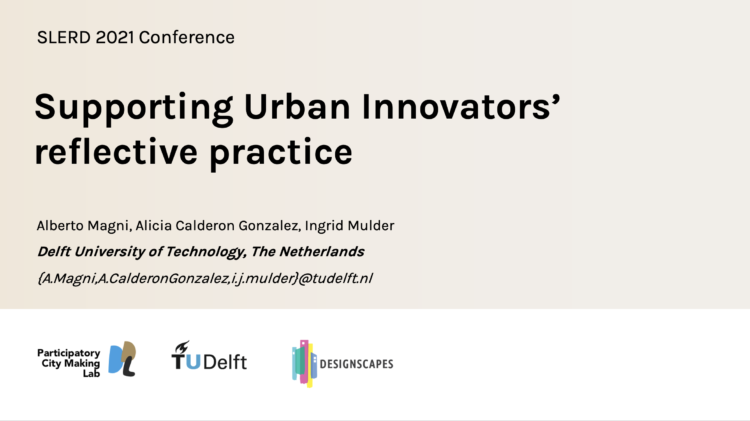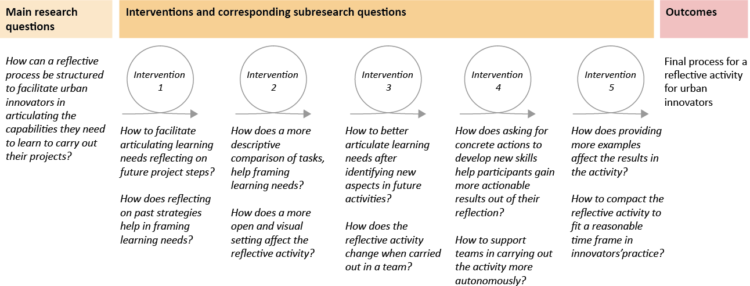A reflective approach to social innovation and regional development
On June 25th, PCM lab researcher Alberto Magni presented at SLERD 2021 Conference, the paper “Supporting Urban Innovators’ Reflective Process”, co-written with Alicia Calderon Gonzalez and Ingrid Mulder. The study, conducted within the European project DESIGNSCAPES, introduces a reflective approach aimed to support the self-directed capacity-building process of urban innovation initiatives.
Perspectives on learning ecosystems
The SLERD 2021 Conference – Smart Learning Ecosystems for Regional Development, welcomes researchers and practitioners from all over the world involved in the development of Smart Learning Ecosystems and Smart Education. More precisely, it concerns the study of infrastructures and ecosystems that can facilitate learning and development, and ultimately function as “engines of social innovation and territorial development”. Invited to present his research in the Paper Session “People in Place Centered Design for Smart Learning”, Alberto could share the insights gained on introducing reflection as a tool for self-directed capacity building within the practice of urban innovators selected in the DESIGNSCAPES project.
Next to Alberto’s research, other lenses on learning ecosystems were investigated by the researchers presenting in the panel. In particular, the other research papers presented in the session investigated how to enable better learning infrastructures for post-Covid 19 pandemic education, how to improve gender equality in ICT education through game design, and finally how to facilitate the usability of open cultural data for educational purposes.
The variety of studies within the conference gave the opportunity to discover different perspectives on designing for Smart(er) Learning Ecosystems. Despite differences in theme and focus, the different studies provided considerations and insights that could also be applicable to the scope of capacity building for urban innovation. For example, considerations on hybrid learning environments, or accessibility of open data.
Overall, the conference highlighted how learning ecosystems can be explored through multiple lenses and infrastructured in largely different domains, ultimately showing how a diverse range of valuable infrastructures can be developed to support societal innovation as a collective learning process.

Supporting Urban Innovators’ Reflective Practice
In the past years, a growing number of local initiatives are generating solutions for societal challenges in their cities. However, the diverse backgrounds and perspectives within their teams, in addition to the scale and complexity of societal challenges, force urban innovators to constantly adapt and learn, having to acquire new capabilities that will help them advance towards systemic change. The premise of the study is, in fact, that for urban innovators to push their interventions beyond the boundaries of small innovative niches, they need to be able to utilize the urban context as a learning ecosystem. In particular, in line with Schön’s reflective practice, reflection is seen as a core competence for these urban change makers to grow and a reflective approach is presented, to support urban innovators in framing their learning journey to succeed in their projects. A series of reflective sessions have been conducted to investigate how to structure a reflective process that helps innovators identify challenges in their projects as well as the new competencies they need to acquire to achieve them.

The paper illustrates the developed reflective process and elaborates on the insights gained on introducing reflective activities as a tool supporting urban innovators in self-defining their learning journeys. Overall, the study showed that the reflective approach was valuable for urban innovators in carrying out their design-enabled urban innovation projects and helped identify strategies for developing new capabilities. Nevertheless, further research can contribute to more effectively translate the learnings gained into actionable steps to help sustain innovators’ self-development.
The full article can be found here.
To cite this work please refer to it as follows: Magni A., Calderón González A., Mulder I. (2022) Supporting Urban Innovators’ Reflective Practice. In: Mealha Ó., Dascalu M., Di Mascio T. (eds) Ludic, Co-design and Tools Supporting Smart Learning Ecosystems and Smart Education. Smart Innovation, Systems and Technologies, vol 249. Springer, Singapore. https://doi-org.tudelft.idm.oclc.org/10.1007/978-981-16-3930-2_2